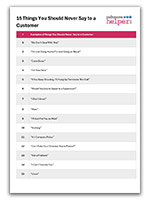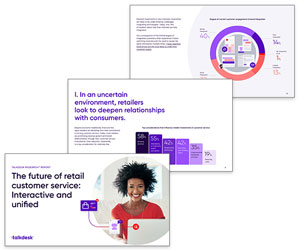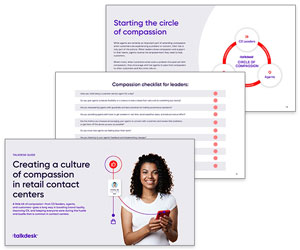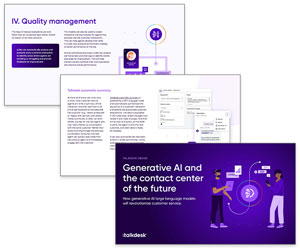We are regularly asked ‘what are the key do’s and don’ts of a call centre agent?’ and a major ‘do’ is making agents aware of what NEVER to say.
While agents are frequently told what to say in the form of a script, informing staff of statements that negatively influence a customer–agent is often neglected.
Phrases to Avoid in Customer Conversations
Effective call centre phone etiquette is essential for great customer service and by adopting more empathetic and professional language, you can improve customer satisfaction and handle calls more effectively.
We have put together 15 things you should never say to a customer and provide examples of better alternatives.
1. “We Don’t Deal With That”
If you work in sales and your current caller has a question about billing, then it’s probably true – you don’t deal with that. But this is a really negative way of wording it.
Sore throats, noisy neighbours and printer problems are the type of things we ‘deal with’. Telling the customer you don’t ‘deal with that’ makes them feel like an inconvenience and a burden.
Say Instead: “It sounds like you need [X department]. I’ll just transfer you/find you the number.”
If you want to create your own “say instead” examples for statements that you dislike agents using, you can find some helpful guidance in our article: How to Create a Positive Scripting Experience in Your Contact Centre
2. “I’m Just Going Home/I’m Just Going on Break”

Ideally, the last caller of an agent’s shift should get the same service as the first, even if it makes the agent late home.
Sadly, that’s just the way of the job. But even if you absolutely have to be out the door bang on 5pm, don’t make the caller feel like an inconvenience.
Say Instead: “I just need to pass you over to a colleague. Sorry to keep you.”
3. “Calm Down”
If a caller is shouting, it’s very likely they’re already feeling undervalued, belittled and powerless. So giving them an order is only going to fan the fire.
Say Instead: “I can solve this problem for you, but only if we can discuss it calmly.”
Another way to calm down an angry customer is by using empathy to avoid fanning the fire. Find some good examples of empathy phrases by reading our article: 18 Empathy Statements That Help Improve Customer–Agent Rapport
4. “I’m New Here”

This is a pretty understandable thing to say if you are indeed new to the job and you’re getting a bit flummoxed, but you still shouldn’t say it.
It instantly kills the customer’s confidence in you, and they’d be quite justified in asking to speak to someone else. There are plenty of ways to ask a colleague for help without making the customer think you’re out of your depth.
Say Instead: “I just need to consult with a colleague. The line will go quiet for a minute or two.”
5. “If You Keep Shouting, I’ll Hang Up/Terminate This Call”
Much like #4, laying down the law with an angry caller isn’t wise or helpful.
There’s another issue with this phrasing too: if you actually do hang up on an angry customer, you’re just passing the problem on to a colleague. That person will usually call back, and will be even more abusive with whoever answers – which could still be you.
Say Instead: “I can solve this problem for you, but we need to discuss it calmly.”
But what if the customer is being abusive or swearing?
In this case, it is fair to warn the customer twice, and then terminate the call. We have produced a contact centre policy for dealing with abusive customers.
For more advice on taking phone calls from irate callers, read our piece on: Dealing with Angry Customers
6. “Would You Like to Speak to a Supervisor?”
Sometimes you hit a total stalemate with a customer and it seems inevitable that they’ll soon be asking for someone more senior. It’s tempting to save everyone’s time and offer to pass them straight up the chain of command, but you shouldn’t. For three reasons:
- Your immediate superior will not appreciate it.
- If you do this often, customers will think of you as nothing more than a gatekeeper to getting what they want and will always ask for a supervisor.
- You should have the confidence to give a final answer yourself.
If the customer asks to speak to a manager, then of course you should oblige. But in a well-run call centre, your answer and your supervisor’s answer should be exactly the same.
Say Instead: “What would you suggest for us to solve this problem for you?”
Whilst customers think that supervisors and managers are the best people to talk to, sometimes they can say the wrong things as well. Find out more by visiting our page that highlights: Five Phrases a Call Centre Manager Should Never Use
7. “I Don’t Know”
This is another one that can completely kill a customer’s confidence in you. No one expects you to know all the answers, but you should at least be confident and positive about finding the answers if you don’t.
Say Instead: “That’s not something I know off the top of my head, but I can certainly find out for you.”
Using the phrase “I don’t know” is a strong example of a contact centre “oh no” moment. For more examples similar to this, visit our page on: The Top 10 Call Centre ‘Oh No!’ Moments
8. “Mate”
It’s good to speak naturally and have a proper conversation rather than a robotic exchange of information. But if you’re saying “what can I do for you, mate?” and “no problem, mate” then you’ve taken it way too far in the opposite direction.
Say Instead: Their name, Mr X or Mrs X, is the starting point – first names can be okay, but only when you’ve judged the tone of the conversation just right.
9. “I’ll Just Put You on Hold”
Probably the most disliked phrase in the entire customer service industry.
Putting a customer on hold is fine – everyone has to do it at some point. But ‘on hold’ is a toxic pairing of words, to which most people roll their eyes as a reflex.
Before putting a caller on hold, make sure they know why you’re doing it and roughly how long you’ll be gone.
Say Instead: “I need to [do something]. I’ll be back on the line with you soon – two or three minutes at the most.”
10. “Nothing”
‘Dead air time’ is generally something to avoid. But just like #10, it’s fine as long as the customer knows what’s going on.
If you need thirty seconds or so just to read through something or run a calculation, make sure you’ve told the customer why you’re going silent.
No caller should ever have to say “hello?” or “are you still there?” unless they’ve just entered a tunnel.
Say Instead: “This is just going to take 30 seconds or so – I’m still here, I’m just going to do some calculations.”

11. “It’s Company Policy”
Advisors being evasive with customers is a big problem in a number of contact centres.
An example of this would be when an advisor makes a statement like “it’s company policy”.
This statement signals that the advisor just wants to hang up on the customer, but, in truth, company policies are highly unlikely to intrude upon basic customer expectations.
With thanks to Matt Phil Carver.
12. “Can I Take Your Christian Name Please?”
You wouldn’t ask someone for their Jewish name or their Muslim name, so you certainly shouldn’t ask anyone for their Christian name.
Yet this question is still heard alarmingly often. It’s a fairly innocent mistake to make, but it shows a cultural insensitivity that always sounds unprofessional, even if the caller happens to be a Christian.
Say Instead: “Can I take your first name please?”
13. “Not a Problem”
My pet hate is “not a problem”, which always makes me think “No one thought there was a problem, but now you mention problem …” It is far better to frame it as a positive.
Say Instead: “Of course I can do that for you” or “I’d be delighted to …”
Thanks to Nick
14. “I Can’t Transfer You”
I hate advisors saying I can’t transfer you, they are not answering the phone. This may be a result of a company policy, but it can also be due to incompatible telephone systems.
Ideally, you need to change the policy or investigate the ways that technology could allow you to transfer calls. If this is not possible, ask the customer for their details and call them back.
Say Instead: “I’m unable to transfer, but I can provide the direct contact details.” or “Unfortunately, I can’t transfer you directly, but I can guide you through the process.”
Thanks to Rob
15. “Ummm”
My biggest concern with phone agents is the “ummms” that happen.
“Let me, um, research that further, um, and I’ll, um, be back with you, um, in, um, 2-3 minutes.”
Thanks to Chris
Printable – 15 Phrases to Avoid in Customer Service
Download our free printable 15 phrases to avoid in customer service now:
For more on call handling techniques in customer service, read our articles:
- What to Say to an Angry Customer
- The Best Ways to Start and End a Customer Conversation
- Call Control Techniques: Controlling a Runaway Talker on the Telephone
Author: Jonty Pearce
Reviewed by: Megan Jones
Published On: 21st Feb 2018 - Last modified: 13th Sep 2024
Read more about - Skills, Angry Customers, Customer Service, Downloads, Editor's Picks, Empathy, Language, Matt Phil Carver, Printable, Rapport





















